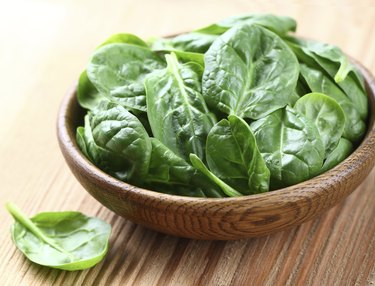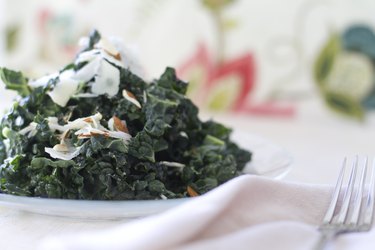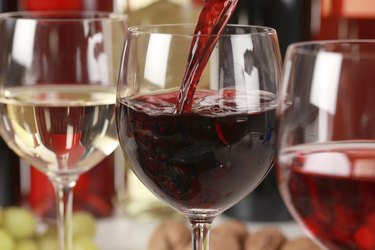
Blood clots can be a deadly occurrence, contributing to heart attack and stroke. If your physician suspects you are at risk for blood clots or if you have experienced them in the past, he may recommend taking a blood-thinning medication. These medications can reduce your risk for a life-threatening event -- but you must take special precautions when taking these medications, particularly avoiding certain foods in your diet that can interfere with how well your blood thinner works.
Vitamin K Interference
Video of the Day

The biggest change to your diet while taking blood-thinning medications like warfarin will be to avoid foods that contain vitamin K. This vitamin plays a vital role in blood clotting, and it can interfere with how warfarin works in your body. While you can eat some amount of vitamin K-containing foods, your physician may recommend avoiding foods that have high levels of vitamin K.
Video of the Day
Vitamin K Foods

Many leafy, green vegetables are high in vitamin K. This includes kale, spinach, Brussels sprouts, parsley, mustard greens, chard and collard greens. Also, green tea tends to be high in vitamin K and should be avoided in your diet while you are taking blood thinners.
Blood-Thinning Foods

Just as certain foods can contribute to blood clotting, others can cause blood thinning. This is a concern when you are taking blood thinners, because if your blood becomes too thin, even a small cut can cause you to lose excessive amounts of blood. Examples of foods known to be natural blood thinners include cranberry juice and alcohol. Talk to your physician about what intake, if any, of these foods is acceptable while you are taking blood thinners. If you are generally otherwise healthy and do not have liver damage, your physician may recommend limiting your intake to one to two alcohol servings per day, according to the Marshfield Clinic, a Wisconsin-based health-care clinic. One serving is equal to about 5 ounces of wine, 1 ounce of liquor or 12 ounces of beer.
Considerations

Because vitamin K-containing foods are often healthy vegetable sources in your diet, you may have a difficult time eliminating them completely. If this is the case, talk to your physician about the vitamin K servings you tend to enjoy daily. By understanding how much vitamin K you consume on average, your physician can adjust your medication dosage to allow for a certain daily intake. Other than avoiding foods known to interfere with blood thinners, you can generally keep the same diet you had before you started taking the medication.